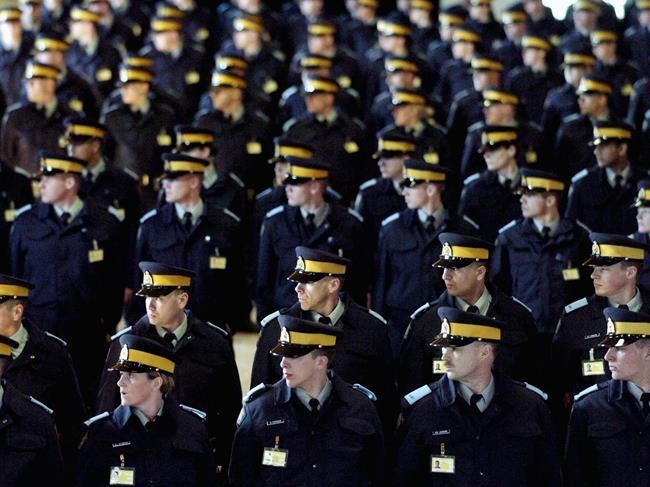OTTAWA — A timeline of some key events in the evolution of the RCMP's structure and responsibilities:
May 3, 1873: Act establishing the North-West Mounted Police introduced by then-prime minister John A. Macdonald.
May 23, 1873: Bill passes unopposed through Parliament and receives royal assent. However, it does not immediately establish NWMP, as it is merely an emergency measure.
Aug. 30, 1873: Order-in-council brings NWMP into existence.
Oct. 18, 1873: George Arthur French becomes first permanent commissioner.
Nov. 3, 1873: First 150 recruits for the NWMP gather at Lower Fort Garry, Man., north of Winnipeg.
July 8, 1874: March West to what is now Alberta begins at Fort Dufferin in Manitoba.
1876: First public performance of riding skills at Fort Macleod in Alberta.
1887: Musical Ride first performed at Regina.
June 5, 1895: A NWMP contingent leaves for Yukon, extending presence to northern frontier.
June 24, 1904: King Edward VII confers title of "Royal" upon North-West Mounted Police.
July 21, 1908: Order-in-council approves fingerprint system.
Jan. 1, 1917: RNWMP is relieved of provincial policing duties in Manitoba and Saskatchewan, with the creation of their own provincial police forces.
1919: Force's pan-Arctic presence includes 25 detachments and over 70 men.
July 14, 1919: Order-in-council increases size of the RNWMP to 2,500 members.
Feb. 1, 1920: The Royal North West Mounted Police becomes the Royal Canadian Mounted Police with absorption of the Dominion Police. Headquarters is moved to Ottawa from Regina.
June 1, 1928: RCMP takes over provincial policing duties for Saskatchewan.
April 1, 1932: RCMP absorbs provincial police organizations for Alberta, Manitoba, New Brunswick, Nova Scotia and Prince Edward Island.
April 1, 1932: Patrol boats and personnel are transferred from Department of National Revenue, creating RCMP Marine Section.
April 1, 1937: RCMP Air Services is created with the purchase of four planes.
April 1, 1960: Civilian member category created in RCMP for work in crime-detection laboratories and various technical fields.
1966: Last year of mandatory equestrian training for all recruits.
June 30, 1967: David Lawrence, RCMP's first Black member, begins training in Regina.
March 3, 1975: First all-female troop graduates.
July 16, 1984: RCMP Security Service ceases to exist with duties taken over by newly formed civilian agency, the Canadian Security Intelligence Service.
1989: Last female-only troop goes through training.
Oct. 19, 1989: RCMP contingent sent to Namibia to monitor elections, making the first time the force participated in a United Nations mission.
1990: Baltej Singh Dhillon becomes first RCMP member to wear a turban during recruit training.
1992: Women are issued iconic Stetson, boots and breeches for first time.
Dec. 16, 2006: Beverley Busson becomes interim commissioner, first woman to hold post.
Oct. 5, 2011: New RCMP headquarters opens in Ottawa.
April 16, 2018: Brenda Lucki becomes first permanent female commissioner.
(Sources: RCMP, The Canadian Press)
This report by The Canadian Press was first published May 22, 2023.
The Canadian Press



